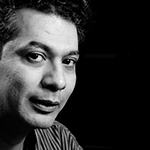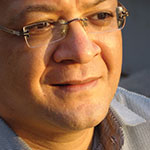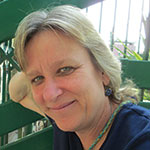Checking out the Apartment

An apartment on the bank of the Nile River for a fair price sounds like a no-brainer, unless that apartment happens to be right next to one of the most infamous prisons in Egypt.
The story started with a phone call from Mohsen. He found an apartment on the Nile. The price was within my budgeted savings. I refused right away when I learned it was close to Tora Prison. I also smelled a rat because it was so cheap. “You don’t lose anything if you come look at it.” I had heard this statement so much that I thought I would gain nothing but looking at apartments and imagining myself living in them. I decided to go since this was the first apartment Mohsen had offered to show me himself—he had heard most of my apartment stories.
I arrived on time. Not that I was usually punctual, but because the traffic was unexpectedly light along the corniche, flowing so smoothly a passenger in the microbus kept saying, “What’s up?”—unconvinced by any of the answers of the other passengers, commenting on them: “For sure, it’s something else,” without adding a different answer.
I got off the microbus. “The third building after the prison, straight ahead,” as Mohsen described in a way that suggested the address was a piece of cake. But I felt sour when I imagined having to repeat this description to a guest, obliged to share the laughter whenever he pretends he is afraid of the prison. I stood in front of the door of the building. I found a man wearing a white galabia, a traditional loose-fitting gown, coming out with two plastic chairs in hand. “I am Ismail. Come and sit on the corniche.” He said it with such gusto and so quickly, as if he were saying his full name. Mohsen had told him about me and had asked him to meet me since he would bring one of the heirs of the building. He was happy to be introduced to me without asking me whether I was the potential customer. He did this with all buyers of the apartment that he received; most of them were surprised by his sharp intuition; in fact, I was easy to recognize since I was standing near the entrance and kept looking at him as he approached. He pointed with one of the chairs to the window on the ground floor, “This is my apartment,” and then pointed higher, “and that’s your apartment on the fourth floor.” And then he pointed toward the Nile and said, “And that’s the living room.”
He pointed with one of the chairs to the window on the ground floor, “This is my apartment,” and then pointed higher, “and that’s your apartment on the fourth floor.” And then he pointed toward the Nile and said, “And that’s the living room.”
He pointed with a raised chair toward the oncoming cars, while crossing the road. Carrying the other chair, I felt as if I were crossing into the parlor of an apartment whose boundaries have been erased and kept extending. He told me that Mohsen’s father used to hang out with him here often. Once we sat down, I glanced at the prison fence. He told me that we have a better view than other tenants who overlook the prison and that I will never see, like them, the courtyard or the prisoners milling around on break or performing push-ups as punishment or getting their hair shaved on their first day. All the prison talk that he repeated was the weirdest thing I had heard while scouting for apartments. Instead of hearing words like “the grocery store, the souk, the school, the kindergarten, the subway station” and the essential features of the area where the apartment was located, the prison became the center around which these features revolved. For example, the souk was next to the guest house for inmates’ families while the best grocery store was in front of the prison’s back gate. The pharmacy on this street was between the prison and the adjacent buildings, and the best honey might be purchased from “Sergeant Abdullah.” I wondered why the apartment had not been sold, despite the many customers. Most of them did not fancy living next to a prison, he said, pointing toward the river, making fun of anyone obsessed with the prison who couldn’t appreciate such a view. If he were given another choice, he would have picked the same apartment again. What more could he ask for than to open his window and view the Nile: if he got bored sitting in the apartment, it took him just a few steps only to cross the road, carrying the plastic chair to sit on the riverfront. It looked like he used to repeat this same spiel to everyone. He might even acquiesce to receive customers so he could fend for the neighborhood and its people. I asked him about the other reason that the apartment had not sold—it seemed impossible that all who came were obsessed with the prison: some would accept worse neighborhoods than this. The apartment must have another flaw: too small; an old, rundown building; close to a cement plant. He yelled out that those he received never complained about this: their problem was with the prison, as if they were afraid of eventually becoming inmates.
The apartment must have another flaw: too small; an old, rundown building; close to a cement plant. He yelled out that those he received never complained about this: their problem was with the prison, as if they were afraid of eventually becoming inmates.
A soldier on a horse stopped near the building and gestured to him. He excused himself to go and “give the horse a piece of sugar.” He crossed the road, raising his hand toward the cars. He jimmied open his apartment window and grabbed a plastic bag from the ledge inside, giving it to the soldier. They started chatting and laughing a little, and then the soldier turned toward the wall. The horse trotted slowly, as if he were trying to make the short distance last longer.
Once he returned, he asked me, “How do you like them apples?”
“They all look like your friends.”
He whispered that his first wife didn’t like this scene a bit, even though she didn’t mind the things he bought from the soldiers at the best price. And she hated to open the window in the morning to find a soldier on his horse in front of her. It’s true that he would scram once he caught sight of her. But she kept cursing the morning, which began with a view of one of the soldiers from the prison, thinking he might jump inside the room.
I imagined this talk gave him some pleasure to whomever would listen. He advises them in a whisper to grab the apartment if they like it, like he did with me, regardless of what everyone else said about it. But the most important thing—as he kept repeating—was to see the prison like any other building, not to be obsessed with it. I asked him about his children’s opinion, confident that they think otherwise, so I could stop him from promoting the beauty of the neighborhood. While asking him, I realized that I am giving him the chance to tell his story: not to talk about the apartment. He smiled, replying that many people he received asked him the same question. As if his opinion didn’t matter, unless his wife and children approved. His wife was certain that her children will, like her, hate the place. They will complain to them about the mockery of their classmates. The best thing for them, as a couple, is to move to another apartment before they have children. She offered him an apartment in her uncle’s building. Ismail agreed on one condition: he would not pay the deposit. He would give up his current apartment that almost cost him nothing in rent on the riverfront to the landlord for a sum of money that would go directly into her greedy uncle’s pocket. He prefers to keep the corniche apartment for their children to secure their future instead of leaving it to chance. His wife wasn’t convinced with his line of reasoning; it was not his habit to think ahead or be cautious. In addition, she will raise her children at a higher standard of living, not merely residing next to a prison. Every time they would talk about children, he would feel they became more annoying, even before he has heard their voices. He never hated children, but through her, he saw them plotting life and setting limits on what he could do; he imagined them already convinced of her opinion, screaming in his face day and night until they left the place. As if their children had heard their perpetual quarrels and decided they were better off unborn. They must have been so angry with him that he never saw them despite the fact that he married again. “God bless her soul.” He retracted, saying that he is blessing the soul of his second wife. As for the first, he doesn’t know anything.
Mohsen called and said he would be a little late; there was a small problem with one of the heirs of the building and one of them wanted to raise the price after the plausible rumor that was spread: they would move the prison and build a housing compound in its place. I asked him to come right now and forget about the whole thing. Ismail guffawed, which attracted the attention of passersby on the corniche. He was yelling, “Are you kidding me? Move the prison? There are more prisoners inside than people outside.” Since I came, the jail was the spur behind Ismail’s repeated proverbs and wisdom, but he did not wait for any comment because he was confident that others would not see what he saw—they would not believe him so easily. The fact that Ismail was not interested in their opinions guaranteed him a longer time for an audience. He told me that every now and then, this rumor would be spread and repeated by inhabitants of the area, as if it were about to happen. His first wife was happy to hear it until they got divorced, thinking that God had answered her prayers. She continued waxing lyrical about the beauty of the neighborhood and the Nile once the prison had disappeared. She was in better spirits for a few days, looking forward to a change, and then went back to her old sour grapes.
The man asked me about my opinion, gazing at the Nile, as if he wanted to compare what I would say to something he could see in the water.
A truck full of prisoners stopped in front of the building. The driver hollered to Ismail. He hurried across the road, taking a plastic bag from him and exchanging a few words. Cars behind them started to honk impatiently. The prisoners were staring at the outside and shouting at people walking by the riverfront. One of them shouted while the truck was moving, “Hey, Ismail, give us a cig.” Ismail opened the window of his apartment and put the bag inside. Before crossing the road, he went back to the entrance of the building and talked to a man, pointing his index finger at the apartment on the fourth floor, and then both headed toward me. He told me, while patting the shoulder of the man, that this guy had also come to have a look at the apartment and he recognized him easily, like what happened with me, and that “the microbus driver told him about the rumor.” The man asked me about my opinion, gazing at the Nile, as if he wanted to compare what I would say to something he could see in the water. I told him I had not seen the apartment and the heirs had not settled on a price yet. I would not buy it. As for the prison—and I was about to say—and the history of its sons, “He will tell you all about them.” Ismail tried to get me to wait for Mohsen and almost brought a third chair, but I refused, and then he was busy, trying to persuade the other customer to stay, saying, “At least have a look at the apartment.” Before the microbus left, I saw the two of them sitting together, Ismail talking and pointing at the prison. I caught a glimpse of the soldier on the horse, heading toward the building. I thought I should have asked him: “How many people out of those who came here actually looked at the apartment?”
Translation from the Arabic
By Gretchen McCullough
Reviewed by Mohamed Metwalli
 Mohamed Metwalli won the Yussef El-Khal Prize by Riyad El-Rayes Publishers in Lebanon for his poetry collection Once upon a Time in 1992. He was poet-in-residence at the University of Chicago in 1998. Other collections include The Story the People Tell in the Harbour (1998), The Lost Promenades (2010), and A Song by the Aegean Sea (2015). He compiled and co-edited an anthology of offbeat Egyptian poetry, Angry Voices, published by the University of Arkansas Press in 2002.
Mohamed Metwalli won the Yussef El-Khal Prize by Riyad El-Rayes Publishers in Lebanon for his poetry collection Once upon a Time in 1992. He was poet-in-residence at the University of Chicago in 1998. Other collections include The Story the People Tell in the Harbour (1998), The Lost Promenades (2010), and A Song by the Aegean Sea (2015). He compiled and co-edited an anthology of offbeat Egyptian poetry, Angry Voices, published by the University of Arkansas Press in 2002.
Editorial note: From Montasser Al-Qaffash’s story collection At Eye Level, which won the 2014 Sawiris Prize for Short Fiction.












